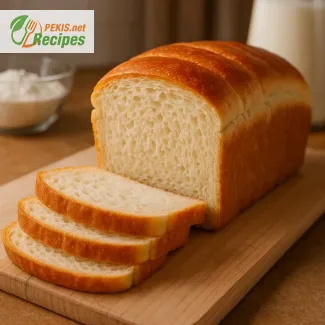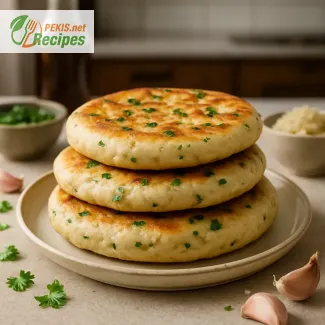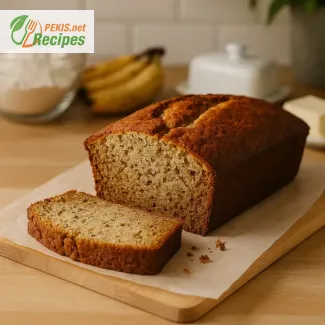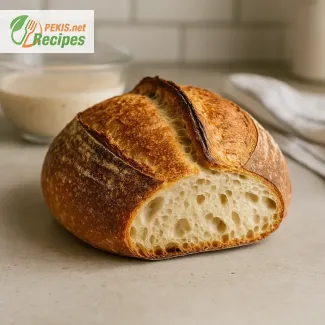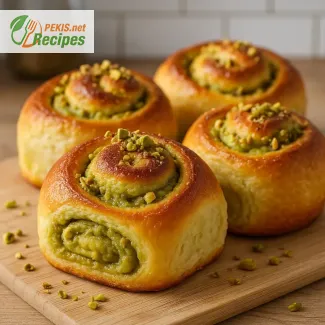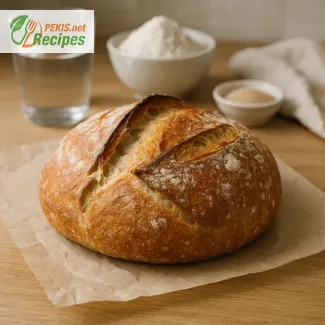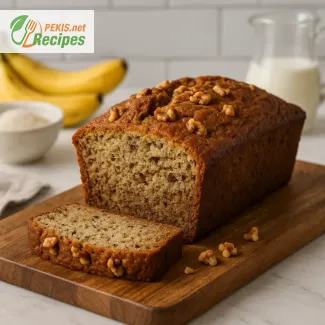
The Perfect Homemade Treat for Any Time of Day
Discover the secrets to irresistibly moist and flavorful banana bread
There’s something timeless and comforting about the aroma of classic banana bread baking in the oven. Whether it's for a cozy weekend breakfast, an afternoon pick-me-up, or a thoughtful homemade gift, banana bread remains one of the most beloved and accessible baked goods in kitchens around the world. Its humble ingredients and rich, moist texture make it the ideal recipe for bakers of all levels, especially those looking to use up overripe bananas in a delicious and satisfying way.
This version of banana bread from scratch pays homage to the traditional recipe that generations have cherished, while incorporating techniques and tips that ensure a perfect loaf every single time. With its soft crumb, golden crust, and the subtle sweetness that only naturally ripened bananas can offer, this banana bread promises to become your go-to homemade bake.
Why banana bread is always in season
Unlike other desserts that come and go with the trends, banana bread has remained a pantry staple. Its simplicity, adaptability, and heartwarming flavor profile allow it to thrive year-round. From chilly autumn days when spices bring warmth to your kitchen, to sunny spring mornings with a cup of coffee in hand, banana bread effortlessly fits every season. The magic lies in its texture – moist, but not soggy; dense, but not heavy – and in its ability to taste even better the next day.
The role of ripe bananas
The star of the show is, of course, the ripe banana. As bananas age and their peels become speckled with black spots, they undergo a transformation. The natural starches convert into sugars, making them sweeter and more aromatic, ideal for baking. These bananas not only provide the essential flavor but also lend moisture and binding power to the batter, replacing the need for excess fat or sugar. When mashed, they release a creamy consistency that melds beautifully with other ingredients, giving banana bread its characteristic texture.
What makes a classic banana bread?
The hallmark of a classic banana bread is balance. You want a loaf that is tender without being overly crumbly, rich but not too sweet, and fragrant with just the right hint of vanilla and banana. A classic recipe includes basic staples such as all-purpose flour, ripe bananas, sugar, eggs, and baking soda. Yet it’s the technique—how the wet and dry ingredients are mixed, the timing of the bake, and the oven temperature—that separates a mediocre loaf from an exceptional one.
In this recipe, every step is designed to elevate the natural qualities of the ingredients. The creaming of sugar and butter creates a lightness in the batter, while the addition of mashed banana at just the right stage ensures even distribution and moisture throughout the loaf. Baking it slowly at a moderate temperature allows the crust to develop without burning, sealing in the flavors and yielding that beautiful golden exterior.
Common mistakes to avoid
Even a simple recipe like banana bread can go awry without the right techniques. One of the most frequent issues is using bananas that are either underripe or too far gone—resulting in a bland or overly wet loaf. Another pitfall is overmixing the batter, which can lead to a tough, chewy texture instead of the desired tender crumb. It's crucial to mix just until the flour is incorporated. Similarly, accurate measuring is key. Using too much flour can dry out the bread, while excess banana or sugar can make it gummy in the center.
For consistent results, always use room temperature ingredients, and don't forget to check your baking soda’s freshness. A loaf that doesn’t rise properly can often be traced back to expired leavening agents.
Variations and flavor boosters
While the traditional loaf is a masterpiece on its own, banana bread is also incredibly versatile. For added texture and flavor, consider folding in toasted walnuts, pecans, or chocolate chips. A touch of cinnamon or nutmeg can enhance the aroma, while a spoonful of sour cream or Greek yogurt can add even more moisture and richness. Some bakers love to add a swirl of peanut butter or a sprinkle of brown sugar and oats on top for a rustic finish.
And let’s not forget presentation. For an elegant touch, slice a banana lengthwise and lay it on top of the batter before baking – it adds visual appeal and an extra burst of caramelized banana flavor right on the surface.
Serving and storing
Banana bread is best served warm or at room temperature, either plain or with a spread of butter. It also holds up beautifully for days when stored properly in an airtight container. In fact, some bakers argue that banana bread tastes better the next day, as the flavors continue to develop. For longer storage, it can be frozen in slices or whole loaves and reheated when needed, making it an ideal choice for make-ahead treats or lunchbox additions.
Whether you're a seasoned baker or just starting out, this recipe for classic banana bread offers everything you need for a perfect result. The blend of wholesome ingredients, time-tested technique, and a bit of kitchen love results in a bake that’s both nostalgic and incredibly satisfying.
- Preheat the oven to 175°C (350°F). Lightly grease a standard loaf pan (approx. 23 x 13 cm / 9 x 5 inch) or line it with parchment paper.
- Combine dry ingredients: In a medium bowl, whisk together the all-purpose flour, baking soda, and salt. Set aside.
- Cream the butter and sugar: In a large mixing bowl, use a hand mixer or stand mixer to beat the softened butter and granulated sugar until light and fluffy (about 3–4 minutes).
- Add the eggs: Beat in the eggs one at a time, mixing well after each addition.
- Incorporate the bananas: Add the mashed bananas to the wet mixture and mix until smooth.
- Add milk and vanilla: Stir in the milk and vanilla extract until fully combined.
- Combine wet and dry ingredients: Gradually fold the dry ingredients into the banana mixture. Stir gently until no dry flour remains. Do not overmix.
- Add mix-ins (optional): If using, gently fold in the chopped walnuts or chocolate chips.
- Pour into the pan: Transfer the batter into the prepared loaf pan and smooth the top.
- Bake: Bake for 55–60 minutes, or until a toothpick inserted in the center comes out clean. If the top browns too quickly, tent it loosely with aluminum foil.
- Cool: Let the bread cool in the pan for 10 minutes before transferring it to a wire rack to cool completely.
Elevating Banana Bread Beyond the Basics
Transform classic banana bread into a custom gourmet experience
When it comes to comfort baking, few recipes are as universally loved as banana bread. But even the most cherished classics can benefit from thoughtful enhancements. With just a few clever modifications, this well-known loaf can go from a simple pantry bake to a deeply flavorful, moist, and personalized creation that rivals artisanal bakery versions. Whether you're looking to intensify the flavor, make it healthier, or correct common issues like dryness or gumminess, there are many ways to refine and enrich your banana bread.
The role of ingredient upgrades
One of the simplest ways to upgrade your banana bread is to swap or enhance a few key ingredients. Starting with the bananas, consider roasting them in the oven before mashing. This caramelizes their natural sugars and intensifies the banana flavor, adding a rich, almost dessert-like depth. Another technique is to use a mix of ripe and very ripe bananas—this adds textural complexity and balances sweetness.
For added moisture and a tender crumb, replace a portion of the butter with sour cream, Greek yogurt, or even buttermilk. These ingredients contribute a gentle tang and help keep the bread moist for days. Using brown sugar instead of white sugar, or a mix of both, imparts a richer, almost toffee-like flavor that elevates the overall taste. A spoonful of maple syrup or honey can also bring a subtle complexity and make the loaf even more aromatic.
Boosting the flavor profile
Spices are often underestimated in banana bread, but adding a small amount of cinnamon, nutmeg, or allspice can make a huge difference. These warm spices complement the sweetness of the bananas and add depth. For an extra layer of richness, a splash of dark rum or bourbon brings out the flavors and adds a faint warmth—perfect for an adult twist.
If you're aiming for a more indulgent version, folding in chopped dark chocolate, cocoa nibs, or a mix of white and dark chocolate chunks can turn your banana bread into a decadent treat. Adding toasted nuts like walnuts, pecans, or hazelnuts provides a satisfying crunch and earthiness that balances the soft crumb.
Making it healthier without losing flavor
Banana bread is often associated with indulgence, but it’s surprisingly easy to make a healthier version that still tastes incredible. Swap out part of the all-purpose flour for whole wheat flour or spelt flour to add fiber and a nutty richness. You can also reduce the sugar by up to 25% if your bananas are very ripe or if you're using add-ins like raisins or dates, which contribute natural sweetness.
Using coconut oil instead of butter provides healthy fats and a subtle tropical aroma. For a vegan-friendly version, use flaxseed or chia eggs (1 tbsp ground flax or chia + 3 tbsp water per egg) and plant-based milk such as almond or oat milk. These swaps not only reduce saturated fat and cholesterol but also make the bread more suitable for different dietary needs.
Adding rolled oats, chia seeds, or ground flaxseed directly into the batter can increase fiber and omega-3 content without significantly changing texture. And don’t forget to include unsweetened applesauce or mashed pumpkin in place of some of the banana to reduce sugar and calories while maintaining moisture.
Common mistakes to avoid
Even experienced bakers can encounter issues with banana bread. One of the most common mistakes is using bananas that are either not ripe enough or overly fermented. For the best flavor and texture, use bananas that are deeply spotted but not leaking or fermented. Another frequent error is overmixing the batter, which activates the gluten in the flour and leads to a dense, chewy loaf. Always stir just until the dry ingredients are incorporated.
Incorrect oven temperature is another trap. Baking at too high a temperature can cause the outside to brown too quickly while leaving the inside raw. Always bake banana bread at a moderate and stable temperature (around 175°C / 350°F), and check doneness with a toothpick inserted in the center. If it comes out clean or with a few crumbs, the loaf is ready.
Using expired baking soda can also prevent proper rising. Always check the freshness of your leavening agents before baking. Lastly, undercooked loaves are sometimes a result of using too much banana or sugar. If your batter feels excessively wet, consider adding a tablespoon or two of flour or increasing the baking time slightly.
Why homemade always wins
Although banana bread can be found in many cafes and supermarkets, homemade banana bread offers unmatched quality and customization. When you bake it yourself, you control the ingredients, the sweetness, and the texture. It’s free from preservatives, artificial flavors, and unnecessary additives. The flavor of home-baked banana bread is also fresher and more intense, especially when made with high-quality bananas and real vanilla extract.
In addition, baking banana bread at home fills your kitchen with an inviting, nostalgic aroma that no store-bought version can replicate. It’s also a chance to create personal traditions, experiment with seasonal ingredients like berries or pumpkin, and involve children in the baking process.
Creative add-ons and presentation
Take your banana bread to the next level with creative toppings and presentation. For instance, sprinkle the top of the batter with demerara sugar before baking to create a sweet, crackly crust. Or slice a banana lengthwise and place it on top of the batter for a visually stunning finish that also enhances flavor.
You can also swirl in peanut butter, almond butter, or Nutella before baking, creating delicious pockets of flavor. Or layer the batter with thin apple slices, shredded coconut, or even a ribbon of cream cheese filling for an unexpected twist.
For an elegant presentation, slice and toast leftover banana bread, then serve it with whipped cream cheese, honey, or a dollop of Greek yogurt. You can even cube it and use it in a dessert trifle or parfait.
Making banana bread uniquely yours
Banana bread’s beauty lies in its versatility. Whether you want to make it richer, healthier, more indulgent, or suitable for dietary restrictions, the recipe welcomes adaptation. Try incorporating zest from an orange or lemon to brighten the flavor, or fold in dried fruit like cranberries or raisins for chewiness and sweetness. If you're looking for a gluten-free version, choose a high-quality baking blend that mimics the texture of traditional flour.
No matter how you choose to improve or personalize it, the foundation of banana bread remains forgiving and rewarding. With a few thoughtful tweaks and a deeper understanding of the ingredients, your next loaf can be more than just a simple quick bread—it can be a reflection of your taste, creativity, and care.
Allergens present in the recipe:
- Gluten (from all-purpose flour)
- Eggs
- Milk (butter and whole milk)
- Tree nuts (if walnuts are used)
Suggestions to eliminate allergens and gluten:
- Gluten-free option: Substitute all-purpose flour with a 1:1 gluten-free baking flour blend containing xanthan gum.
- Egg-free option: Replace each egg with 60 g (¼ cup) of unsweetened applesauce or use 1 tbsp chia seeds soaked in 3 tbsp water per egg.
- Dairy-free option: Use plant-based butter and unsweetened almond or oat milk.
- Nut-free option: Omit walnuts or replace with sunflower seeds or pumpkin seeds.
- Vitamin B6: 0.2 mg – Supports brain health and metabolism
- Vitamin C: 3 mg – Strengthens immune function and acts as an antioxidant
- Potassium: 180 mg – Maintains normal blood pressure and heart function
- Magnesium: 20 mg – Promotes bone health and energy production
- Calcium: 10 mg – Supports strong bones and muscle function
- Iron: 0.8 mg – Aids in oxygen transport and reduces fatigue
- Dopamine (from bananas): 0.4 mg – May improve mood and brain function
- Flavonoids (if using dark chocolate): 20 mg – Help reduce inflammation and improve heart health
- Phenolic acids (from bananas): 8 mg – Offer anti-inflammatory and cellular protective benefits
- Vitamin E (if using nuts): 1 mg – Protects cells from oxidative stress and supports skin health
